Creating Dragon Age: Inquisition
A few months have passed since the day the game was released, but I fully admit that you have not played or have not completed Dragon Age: Inquisition.
Before reading the article, we recommend you to go through this game.
To say that this article is a spoiler is to say nothing. This is an analysis of the game entirely: from actions that affect the development of the plot, to the very smallest details. Naturally, it is worth playing Dragon Age: Inquisition: this game last year rightfully deserved an award in the Best Single Player category and has one of the most exciting, unusual and fantastic scenes we have seen in PC games.
')

First of all, I want to point out why I added a translation to game development and testing hubs. There are a lot of abstracts in this material that will help both developers and testers look a little differently at the plot of the game and cases. After all, BioWare really makes unique products.
Once again: do not read the article if you do not want to know the outcome of the plot.
Only a few developers can say they fully understand the style of the game. Perhaps a couple of years ago you could say that this is just a “single shooter”, but now the title of “the best single shooter” has deservedly passed to the brainchild of MachineGames. You could call the Bethesda RPG, noting an interesting mix of research, storytelling and controlled freedom. However, most likely, you will understand what I mean if I say the words "BioWare RPG". In the 17 years that led to the creation of Dragon Age: Inquisition last year, this Canadian studio created the basis for video game role-playing games, which no other studio can boast of.
Companion characters, multiplicity of choices and verified plots, the ability to import “saves” files are an integral part of this structure. Philosophical and practical player orientation, flexible functionality allows BioWare to combine individuality and fiction. In my opinion, this is what makes BioWare RPG different from other RPGs from a technical point of view. You can also talk about the genre, and here it is quite important: sensations. In the 90s, id Software has defined the sensations of shooters, the essence of which is crazy catharsis. Bethesda was drawn to change and travel after the lines “see this mountain? You can go there, ”and she turned them into a genre. BioWare achieved something similar, but in this case, developers are more pressing on the emotional, not physical.
If you understand what I mean when I say “BioWare RPG” - I think you experienced these “sensations”.
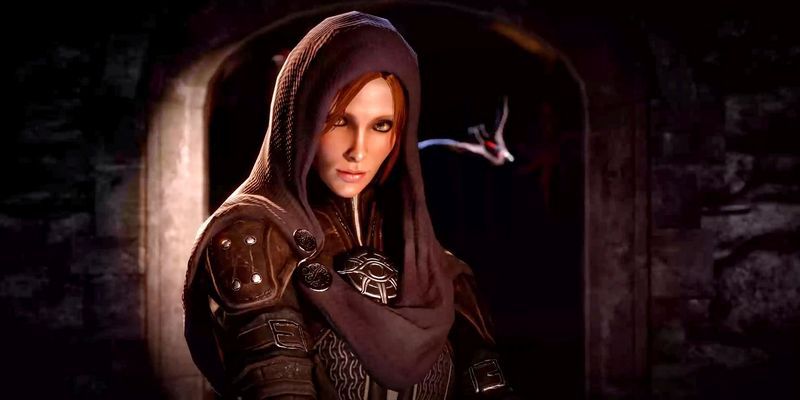
In RPG, unlike other games, you are guided by both head and heart - in fact, I would say that this is the best possible definition of the RPG genre in a world where there is a character development system everywhere. BioWare has done much more than other major developers in terms of exploring the “heart” in this equation, and as a result of these efforts, it has received a huge number of loyal fans, whose work at times is very inspiring. And let's be honest, even angry reviews sometimes give the very necessary impetus for development. Anyway, the company BioWare does not leave people indifferent.
For many years, I was a fan of BioWare. I was waiting for other companies to copy their style, direction, accuracy of character development - but this did not happen. Only Obsidian and InXile can somehow compare with this studio in terms of flexibility in developing various RPG styles, but they are connected with BioWare by one common link - Black Isle Studios. Since I had the opportunity to talk with the Dragon Age: Inquisition development team, what I wanted most of all was to understand how BioWare manages to maintain its distinctive style. I suspect that their characteristics are in no way connected with technical limitations, but they are more related to certain cultural values and priorities - I will begin with this.
says Dragon Age script writer Cheryl Chi, talking about the creative process at BioWare. “When you say“ remember about the player, ”you should try to put yourself in the shoes of different types of players,” adds Patrick Weeks, who was recently appointed lead author of the Dragon Age series script. “We must not just think about the gay players and women. It is necessary to take into account such types as “advanced player”, “player who cares exactly how the game will end,” “player who cares about the plot.” You have to put yourself in the place of players with a different mentality. ”
Former lead author David Geyder adds: “You also need to remember about the balance of what we want to tell and what we can tell our fans. This must be a very responsible approach. Some developers may, sometimes not intentionally, narrow down the potential audience of their game. This happens when you do not feel part of the game, when the feeling comes that "this game is not for you." We create products for a wide audience, and all we want to do is to attract people to our game. ” From a conversation with the team of creators of Dragon Age it becomes clear that this point of view is shared by all members of the team. Considering the situation from different perspectives is the very thing that connects the creative work of the team and the plot presented in the game itself. For BioWare, engagement and social responsibility are essential components of a successful product.
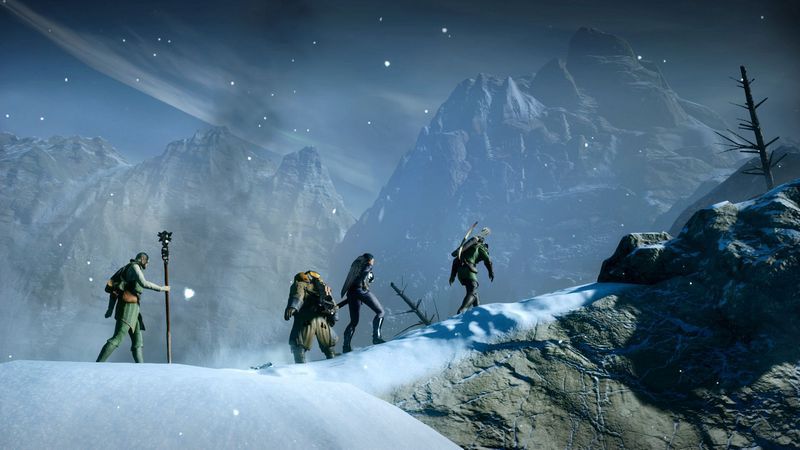
“I’m always interested in the idea that our“ fans ”exist somewhere, let's call them that, and they think that we cannot concentrate and engage in the development of some serious, fantastic moments that must be there,” says Geider. “Let me explain: we, as a team, at some point simply sit down and say that the plot is not fully developed. How will the girl player perceive him? Or a gay player? Or a male player of traditional orientation? How can people interpret the plot? After all, we are responsible for this. ”
The concept of social responsibility of game developers at the present time, unfortunately, is limited only to the political component. So it should not be. Practical fact: the quality of the game is as important for the user as the technical component. You can be sure of this by looking at how the Dragon Age development team reaches and surpasses its own standards: the Inqisition series is incredibly successful in terms of working through even the smallest nuances. The player can create his Inquisitor exactly the way he wants, and his character will be one of many other characters who will have a variety of worldviews, political beliefs and sexual preferences. This game, however, can be a problem for one type of player, who Vicks calls "finalizers" - those who are important to the moment of completeness of the game. The open world of the Inquisition series is combined with numerous quests. It is necessary to "season" the games, and not to consider them simply as "something that needs to be passed." Two months ago, PCG news editor Phil Sawage and I persuaded our editor Samuel to leave the Inner Lands and abandon the bear-claw hunt. ”
“To some extent, we have not worked out the interest of completing the action,” says Mike Leidlow, creative director of the Dragon Age series. “It was important for the“ finishers ”that you could destroy everything you were trying to achieve. I look at it, and, you know what I think? That this will be a good lesson for us. ”
Discussing the issue of the “Inner Lands” prisoners, Laydlow connects him with the problem that was before: playing in BioWare's early RPGs, the players got bored because they had to choose each option to continue the dialogue in order to be able to progress. “The most interesting thing happened when we went to the wheel of communication,” he says. “We observed two types of reactions: some players were upset, it seemed to them that the game was curtailed. But there were other players who, looking at the "explore" option, thought: "Oh, cool, you can skip talking!".
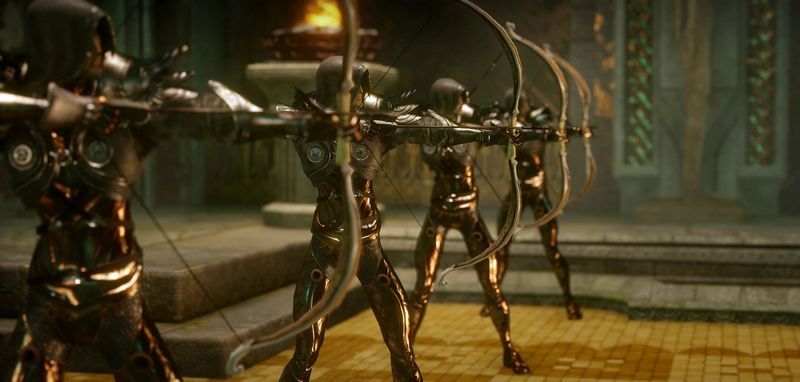
BioWare Studio often shifts part of the responsibility for the development of the game to the player, in which case the question of proportions arises: from the option “the game gives the player too few clear instructions for the plot development” to “the game dictates the player every step”. It is important to think about everything. But the player must be able to destroy all his progress, if it is for something needed. The team’s job is to find the right balance, not to bring the player to the ideal result. “The option to“ explore ”can destroy the development of the plot,” says Geider, “therefore, basically, you need to stick to the plot and at the same time find moments when using this option will be appropriate.”
For Inquisition, the Dragon Age team has developed a new conversation mechanic in order to transfer information that is usually “buried” in “research”. The ability to display the wheel of communication in an open world allows the player to obtain additional information, if he has such a desire, or to completely avoid communication. It all depends on the player, and if the plot changes in some way, then this is the player’s decision. I think that this is the other side of BioWare's social responsibility: its desire to ask the player to “fulfill” what the plot intends by creating new tools that allow this to happen.
This is revealed in the Inquisition of the introduction of a new set of emotional responses that appear after key events: now the player can not just be happy, angry or sad - he can be courageous, confused, upset, and so on. "We always want to give the player the opportunity to respond to everything that happened in the game," says Geider. "In order for the player to realize what happened, and also to make the game" understand "what happened."
"In past games, we forced to respond or avoid expressing emotions," adds Weeks. “The reaction wheel allows you to select the desired reaction - anger, sadness, or, if the player does not attach any importance to this, you can choose something like“ SHEAR. MOVING ON. "
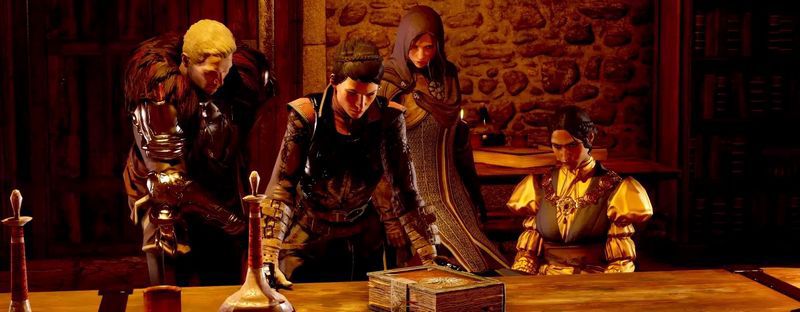
Heyder continues: “We ask the player - do you have any emotions ... feelings after something happened? And the player can switch his mood, choose any emotion: sadness, joy, anger and so on. "
“Instead of saying something,” adds Weeks.
These answers do not greatly influence the plot outside the conversation, but this is not the point. The point is to give the player to feel the result of what happened, even if they can not change anything. This is a realistic way to incorporate emotions into the game, as well as a certain distinction between a situation where something can be changed and a situation in which nothing can be changed, you just have to accept it. But, of course, this line is much more subtle than, say, its implementation in the Mass Effect series.
It seems to me that the complaints and petitions that followed the pessimistic initial end of Mass Effect are nothing more than the refusal of a part of players to carry out their part of the “deal”. Instead of recognizing BioWare’s right to show that bad things happen to good people, many fans said they had the right to happy end. I am interested in the Dragon Age development team, do they believe that they had the opportunity to resist the players and defend the possibility of some kind of tragedy in this case? For example, all the magicians and elves remain, but they are freed from all prejudices that apply to them in the world of Tedas.
“I can’t speak for other authors, but I personally received negative reviews on everything where I restricted the choice of players based on the player’s race or his past,” says Weeks. “I noticed a more positive reaction when I gave players of any race and any experience access to bonus content. Until we made a game where we wanted to show and let us feel how people who are subject to discrimination feel. We wanted to avoid creating situations where, for example, people could do something, but no elves. This, of course, would be realistic, but I do not think that our players want it. ”
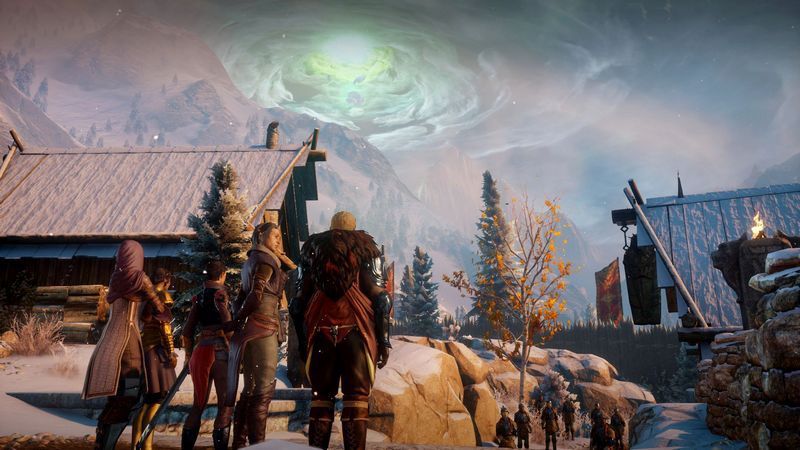
“Sometimes we do it,” interrupts Geyder. "For example, characters who are not human cannot marry Alistair."
“The point of reference here is where I see the choices you make at the end of the Origins section,” says Wicks. "Bonus - become queen Alistair."
“There is a difference between restricting player choices and how the world responds to your decisions,” says Geider. "However, of course, there are situations where the Dragon Age team limits players in order to increase the tension."
“Cheryl can tell about this,” says Weeks, “she killed Hawke's mother. It seemed awful, but I will never launch a petition to save her. ”
“We do it out of necessity,” says Chi.
“This is the thin line between the fact that you add drama to the plot, and the fact that you kick a player only because you can do it,” adds Geider. “I don’t know if we have always done everything successfully, but this is part of the plot — you have to give bad news.”
I am fascinated by the respect and attention that BioWare developers have with the players. Some displacement occurred in securing the love claims of the players during the transition from Dragon Age 2 to Dragon Age: Inquisition. This is another area of contention for fans of this game: the most ardent supporters of BioWare find a deep sense in this, while some users complain that the developer is trying to demonstrate progressive views at their expense. In Dragon Age 2 companion Sebastian was available as a potential object for love for both female characters and men. In the Inquisition part, companions have more specific sexual preferences, which are formed on the basis of their life experience or views. In some ways, the players are more limited, but these restrictions make the relationship more significant. I ask Mike Ladlow about the impetus for such changes.
“I see characters in Dragon Age 2 as bisexual,” he says. “It seems to me that there is a tendency to hide bisexuality, to make sexuality“ invisible, ”and I don’t really like it. When we started creating a part of Inquisition, I looked at the reviews for Dragon Age 2, and it turned out that everything was “too good”, a bit unreal. I do not want to move away from the idea of bisexuality or pansexuality, but still you can not create characters on the principle of "all for all." It doesn't work that way. ”

“We had a desire to create characters that would be traditional and gay, as well as bisexual,” continues Leidlow. “We wanted to make sure that we could create different love stories with a fresh plot, and not just“ I love you ”,“ I love you too ”- they kissed. In addition, we wanted to move away from the predictable scenario in which we had previously created our games. Now the plot is more vital. ”
Over time, creating an RPG, the company BioWare departed from the "simulation" in the conventional sense. Developers began to create difficult social situations for the player, and they are so advanced in this that other developers and studios cannot even come close to BioWare in terms of the detail of such situations. This striving for believability goes against the expectations of some players (for example, in the case of a guy who on the forums requires other players to make love with his character), and also affects the budget of the game. It takes time, money, and the desire to invest your own resources to create all possible interactions with such detail. This is what BioWare does when creating an RPG.
Every time a familiar and beloved character appears in new versions of the game, the studios seem to demonstrate their willingness to invest in it. Often the player's delight from some episode is transferred to the expectations of something more in the next versions. Ultimately, players are disappointed if they do not see all the familiar characters in new games. The Inquisition series differs from the previous versions of the game in the trimmed number of significant heroes. The roles of Varrick, Morrigan, Leliana, Hawke, Alistair and Logain are of course very important, but many other important characters have disappeared. This is not due to lack of time or lack of desire to please the fans. The fact is that BioWare wants to develop the plot, and not just go with the flow.
“We think a lot about it,” says Laydlow. “Whom would we return? Well, we would return a character that is very significant and could bring something into the emotional component of the game, in its texture. We do not want to return the character just so that he was - this is not our way. ”
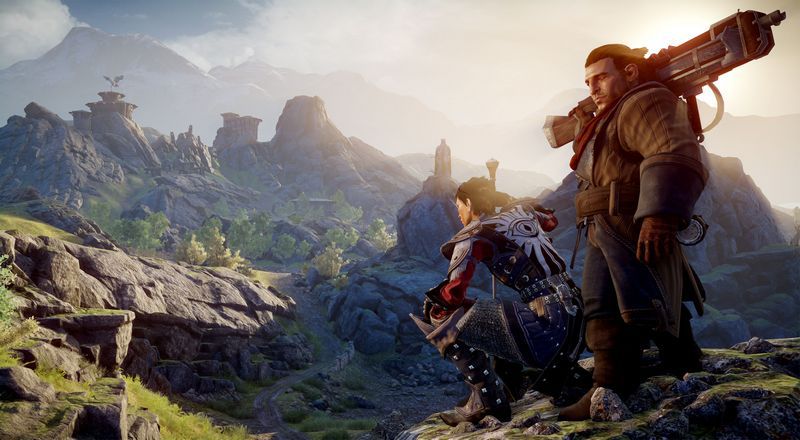
“If we returned all the characters, it would look like a parade,” says Geider. “We have already created two games, one extension and several DLC-add-ons. We cannot just return them. We have already done something similar, and I do not think that this has had a positive impact on our game. So now we are acting very carefully. ”
The risk of working with secondary characters depends on their past. For some characters, for example, for Varrick, the risk is minimal. "This is a very popular character and he has room to develop," says Chi. Varrick had very interesting lines of behavior in Dragon Age 2 and Inquisition. With other characters is not so simple. I'm wondering if the developers regret that they presented the players with some of the characters?
“Daaaaaa?” Draws Chi. “Um, yes,” agrees Geyder. “Sometimes I want to write a letter to Dave’s past and say: in the future, Dave will not like your decisions.”
He continues: “I don’t always regret my actions, but still sometimes thoughts like“ oh, if I’d done differently, ”appear, especially in situations where some cool hero may die. After this, the hero becomes a “Schrödinger character,” and it becomes increasingly risky to include him in the next games. ”
“For example, now we are slowly killing Alistair,” says Geider, “for today he is alive by about 10%.”

When we bring a character into such a state, we call him "Quantum." Sometimes we do not return "quantum" or return with some restrictions. Very rarely, we decide to rewrite history - for example, as in the case of Leliana, who "died" in Origins, but still plays a major role in Inquisition.
“I created it,” says Laydlow. “I thought that Leliana could bring a lot into the game, and I decided to return it. Other authors have been joking with me about this for quite some time. ”
“Poor Cheryl had to write those parts of the storyline in which there were a lot of references to the previous parts of the game,” says Geider.
Cheryl Chi offered options: “She could die, could have a relationship with someone, and then die, she could become“ stronger ”.
“The relationship between Leliana and Morrigan is a relationship between two“ Quantums, ”says Geider. "We created antimatter."
However, there are some cases where a team deliberately creates difficulties to find out the possible heat of the situation. A good example of such situations is the mission “There is the Abyss there,” where you have to decide who to sacrifice: Hawke or one of the three Gray Wardens from previous games. About the complexity of this choice, I asked Mike Ledlow.
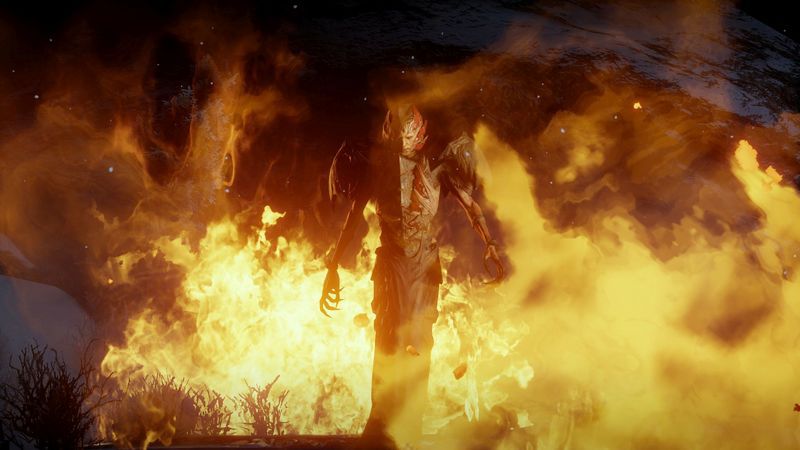
"In this game, I tried to make at least a few situations where I could say:" Wow, the new version is really very different from the previous ones. " From a combinational point of view, the presence of three characters who speak with another character, who may have three personalities, who may be a man or a woman, belong to one of three classes - this is a kind of challenge, a difficult task, but it is very interesting to solve it. How often do you show a character from previous games? Personally, we have not done this before. ”
Here the difficulty was justified because only BioWare offers this. I asked Laidlow if they would like to move further in this direction and add other well-known Gray Wardens, such as the brother and sister of Hawke - Carver and Bethany, Anders or, and this would be just crazy, from Dragon Age: Origins own Player-Commander .
“We thought about it,” he replies. “Sentinel adds tremendous complexity. I think we did it very cunningly, giving voice to characters that were not originally spoken. Many people really wanted a Guardian, and I understood that. The problem is that this is some kind of personal affection, and I’m not sure that we could implement it so that we can please everyone. I feel some respect when I say: “No, your character is too special to realize it. If there is no character at all, the player will have much less negative emotions than if the character is realized, but not in the way that the player wants. ”
This is how BioWare interacts with its most loyal fans: in the Origins part, the players had so many tools for character creation and character that now it’s very difficult to include this character in the next series.
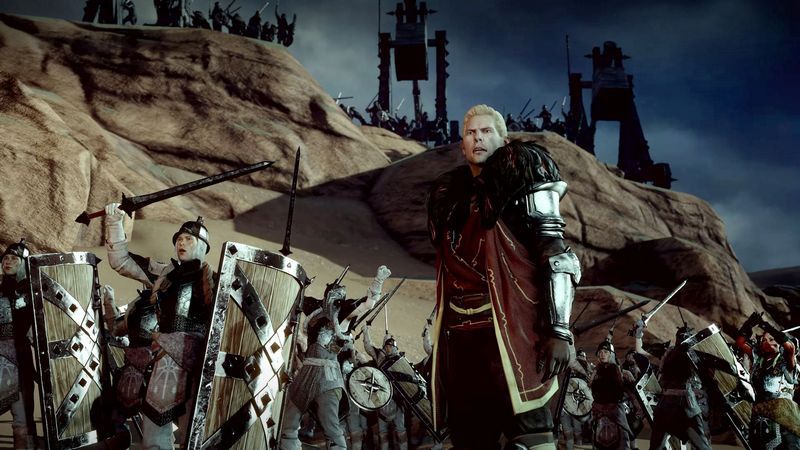
The development team has a strong desire to develop and change the plot.This is the reason for the plot turning, when the companion Solas turns out to be a lost ancient elven deceiver god Fen 'Harel, the Terrible Wolf. This is not the most meaningful move, and it will only matter for those players who have read the Codex entries for three games, and Flemet's “death” in this scene closes the question that stretched from the Origins series. Laidlow calls this move “imitation of the Marvel comics” and compares it with the appearance of Thanos at the end of the film “The Avengers” - the authors slightly open the curtain of the future secrets, but do not expect that everyone will immediately understand everything.
« , «», — . « , - . , , ».
« « » — , « 007 », — . « : «, ?» Dragon Age , , . ».
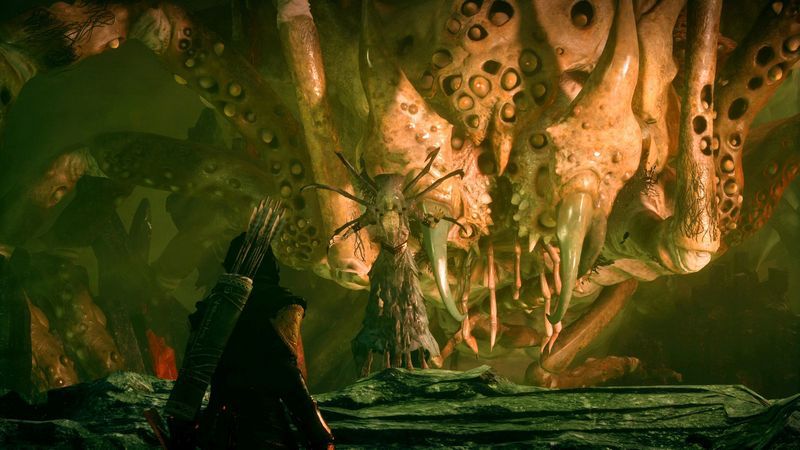
, . , BioWare , , , : «», – , 2009 – . BioWare .
Another fundamental component of the equation is that the BioWare team is a fan of their creativity. “We want to demonstrate that we are not just having fun in the process of creating the game and writing the plot, but also are in constant thought about“ how can we realize our ideas, which is still not enough. ” That’s how Patrick created Solas and all the little things that were relevant to him. ” This is noticeable in the whole game: from the frescoes of Solas in Skyhold to the statues of wolves, which you can see almost everywhere.
, RPG, BioWare, , , , – , , , , , . - , , «», .
Before reading the article, we recommend you to go through this game.
To say that this article is a spoiler is to say nothing. This is an analysis of the game entirely: from actions that affect the development of the plot, to the very smallest details. Naturally, it is worth playing Dragon Age: Inquisition: this game last year rightfully deserved an award in the Best Single Player category and has one of the most exciting, unusual and fantastic scenes we have seen in PC games.
')

First of all, I want to point out why I added a translation to game development and testing hubs. There are a lot of abstracts in this material that will help both developers and testers look a little differently at the plot of the game and cases. After all, BioWare really makes unique products.
Once again: do not read the article if you do not want to know the outcome of the plot.
Only a few developers can say they fully understand the style of the game. Perhaps a couple of years ago you could say that this is just a “single shooter”, but now the title of “the best single shooter” has deservedly passed to the brainchild of MachineGames. You could call the Bethesda RPG, noting an interesting mix of research, storytelling and controlled freedom. However, most likely, you will understand what I mean if I say the words "BioWare RPG". In the 17 years that led to the creation of Dragon Age: Inquisition last year, this Canadian studio created the basis for video game role-playing games, which no other studio can boast of.
Companion characters, multiplicity of choices and verified plots, the ability to import “saves” files are an integral part of this structure. Philosophical and practical player orientation, flexible functionality allows BioWare to combine individuality and fiction. In my opinion, this is what makes BioWare RPG different from other RPGs from a technical point of view. You can also talk about the genre, and here it is quite important: sensations. In the 90s, id Software has defined the sensations of shooters, the essence of which is crazy catharsis. Bethesda was drawn to change and travel after the lines “see this mountain? You can go there, ”and she turned them into a genre. BioWare achieved something similar, but in this case, developers are more pressing on the emotional, not physical.
If you understand what I mean when I say “BioWare RPG” - I think you experienced these “sensations”.

In RPG, unlike other games, you are guided by both head and heart - in fact, I would say that this is the best possible definition of the RPG genre in a world where there is a character development system everywhere. BioWare has done much more than other major developers in terms of exploring the “heart” in this equation, and as a result of these efforts, it has received a huge number of loyal fans, whose work at times is very inspiring. And let's be honest, even angry reviews sometimes give the very necessary impetus for development. Anyway, the company BioWare does not leave people indifferent.
For many years, I was a fan of BioWare. I was waiting for other companies to copy their style, direction, accuracy of character development - but this did not happen. Only Obsidian and InXile can somehow compare with this studio in terms of flexibility in developing various RPG styles, but they are connected with BioWare by one common link - Black Isle Studios. Since I had the opportunity to talk with the Dragon Age: Inquisition development team, what I wanted most of all was to understand how BioWare manages to maintain its distinctive style. I suspect that their characteristics are in no way connected with technical limitations, but they are more related to certain cultural values and priorities - I will begin with this.
We must always remember the player
says Dragon Age script writer Cheryl Chi, talking about the creative process at BioWare. “When you say“ remember about the player, ”you should try to put yourself in the shoes of different types of players,” adds Patrick Weeks, who was recently appointed lead author of the Dragon Age series script. “We must not just think about the gay players and women. It is necessary to take into account such types as “advanced player”, “player who cares exactly how the game will end,” “player who cares about the plot.” You have to put yourself in the place of players with a different mentality. ”
Former lead author David Geyder adds: “You also need to remember about the balance of what we want to tell and what we can tell our fans. This must be a very responsible approach. Some developers may, sometimes not intentionally, narrow down the potential audience of their game. This happens when you do not feel part of the game, when the feeling comes that "this game is not for you." We create products for a wide audience, and all we want to do is to attract people to our game. ” From a conversation with the team of creators of Dragon Age it becomes clear that this point of view is shared by all members of the team. Considering the situation from different perspectives is the very thing that connects the creative work of the team and the plot presented in the game itself. For BioWare, engagement and social responsibility are essential components of a successful product.

“I’m always interested in the idea that our“ fans ”exist somewhere, let's call them that, and they think that we cannot concentrate and engage in the development of some serious, fantastic moments that must be there,” says Geider. “Let me explain: we, as a team, at some point simply sit down and say that the plot is not fully developed. How will the girl player perceive him? Or a gay player? Or a male player of traditional orientation? How can people interpret the plot? After all, we are responsible for this. ”
The concept of social responsibility of game developers at the present time, unfortunately, is limited only to the political component. So it should not be. Practical fact: the quality of the game is as important for the user as the technical component. You can be sure of this by looking at how the Dragon Age development team reaches and surpasses its own standards: the Inqisition series is incredibly successful in terms of working through even the smallest nuances. The player can create his Inquisitor exactly the way he wants, and his character will be one of many other characters who will have a variety of worldviews, political beliefs and sexual preferences. This game, however, can be a problem for one type of player, who Vicks calls "finalizers" - those who are important to the moment of completeness of the game. The open world of the Inquisition series is combined with numerous quests. It is necessary to "season" the games, and not to consider them simply as "something that needs to be passed." Two months ago, PCG news editor Phil Sawage and I persuaded our editor Samuel to leave the Inner Lands and abandon the bear-claw hunt. ”
“To some extent, we have not worked out the interest of completing the action,” says Mike Leidlow, creative director of the Dragon Age series. “It was important for the“ finishers ”that you could destroy everything you were trying to achieve. I look at it, and, you know what I think? That this will be a good lesson for us. ”
Discussing the issue of the “Inner Lands” prisoners, Laydlow connects him with the problem that was before: playing in BioWare's early RPGs, the players got bored because they had to choose each option to continue the dialogue in order to be able to progress. “The most interesting thing happened when we went to the wheel of communication,” he says. “We observed two types of reactions: some players were upset, it seemed to them that the game was curtailed. But there were other players who, looking at the "explore" option, thought: "Oh, cool, you can skip talking!".

BioWare Studio often shifts part of the responsibility for the development of the game to the player, in which case the question of proportions arises: from the option “the game gives the player too few clear instructions for the plot development” to “the game dictates the player every step”. It is important to think about everything. But the player must be able to destroy all his progress, if it is for something needed. The team’s job is to find the right balance, not to bring the player to the ideal result. “The option to“ explore ”can destroy the development of the plot,” says Geider, “therefore, basically, you need to stick to the plot and at the same time find moments when using this option will be appropriate.”
For Inquisition, the Dragon Age team has developed a new conversation mechanic in order to transfer information that is usually “buried” in “research”. The ability to display the wheel of communication in an open world allows the player to obtain additional information, if he has such a desire, or to completely avoid communication. It all depends on the player, and if the plot changes in some way, then this is the player’s decision. I think that this is the other side of BioWare's social responsibility: its desire to ask the player to “fulfill” what the plot intends by creating new tools that allow this to happen.
We always want to give the player the opportunity to respond to everything that happened in the game.
This is revealed in the Inquisition of the introduction of a new set of emotional responses that appear after key events: now the player can not just be happy, angry or sad - he can be courageous, confused, upset, and so on. "We always want to give the player the opportunity to respond to everything that happened in the game," says Geider. "In order for the player to realize what happened, and also to make the game" understand "what happened."
"In past games, we forced to respond or avoid expressing emotions," adds Weeks. “The reaction wheel allows you to select the desired reaction - anger, sadness, or, if the player does not attach any importance to this, you can choose something like“ SHEAR. MOVING ON. "

Heyder continues: “We ask the player - do you have any emotions ... feelings after something happened? And the player can switch his mood, choose any emotion: sadness, joy, anger and so on. "
“Instead of saying something,” adds Weeks.
These answers do not greatly influence the plot outside the conversation, but this is not the point. The point is to give the player to feel the result of what happened, even if they can not change anything. This is a realistic way to incorporate emotions into the game, as well as a certain distinction between a situation where something can be changed and a situation in which nothing can be changed, you just have to accept it. But, of course, this line is much more subtle than, say, its implementation in the Mass Effect series.
It seems to me that the complaints and petitions that followed the pessimistic initial end of Mass Effect are nothing more than the refusal of a part of players to carry out their part of the “deal”. Instead of recognizing BioWare’s right to show that bad things happen to good people, many fans said they had the right to happy end. I am interested in the Dragon Age development team, do they believe that they had the opportunity to resist the players and defend the possibility of some kind of tragedy in this case? For example, all the magicians and elves remain, but they are freed from all prejudices that apply to them in the world of Tedas.
“I can’t speak for other authors, but I personally received negative reviews on everything where I restricted the choice of players based on the player’s race or his past,” says Weeks. “I noticed a more positive reaction when I gave players of any race and any experience access to bonus content. Until we made a game where we wanted to show and let us feel how people who are subject to discrimination feel. We wanted to avoid creating situations where, for example, people could do something, but no elves. This, of course, would be realistic, but I do not think that our players want it. ”

“Sometimes we do it,” interrupts Geyder. "For example, characters who are not human cannot marry Alistair."
“The point of reference here is where I see the choices you make at the end of the Origins section,” says Wicks. "Bonus - become queen Alistair."
“There is a difference between restricting player choices and how the world responds to your decisions,” says Geider. "However, of course, there are situations where the Dragon Age team limits players in order to increase the tension."
“Cheryl can tell about this,” says Weeks, “she killed Hawke's mother. It seemed awful, but I will never launch a petition to save her. ”
“We do it out of necessity,” says Chi.
“This is the thin line between the fact that you add drama to the plot, and the fact that you kick a player only because you can do it,” adds Geider. “I don’t know if we have always done everything successfully, but this is part of the plot — you have to give bad news.”
I am fascinated by the respect and attention that BioWare developers have with the players. Some displacement occurred in securing the love claims of the players during the transition from Dragon Age 2 to Dragon Age: Inquisition. This is another area of contention for fans of this game: the most ardent supporters of BioWare find a deep sense in this, while some users complain that the developer is trying to demonstrate progressive views at their expense. In Dragon Age 2 companion Sebastian was available as a potential object for love for both female characters and men. In the Inquisition part, companions have more specific sexual preferences, which are formed on the basis of their life experience or views. In some ways, the players are more limited, but these restrictions make the relationship more significant. I ask Mike Ladlow about the impetus for such changes.
“I see characters in Dragon Age 2 as bisexual,” he says. “It seems to me that there is a tendency to hide bisexuality, to make sexuality“ invisible, ”and I don’t really like it. When we started creating a part of Inquisition, I looked at the reviews for Dragon Age 2, and it turned out that everything was “too good”, a bit unreal. I do not want to move away from the idea of bisexuality or pansexuality, but still you can not create characters on the principle of "all for all." It doesn't work that way. ”

“We had a desire to create characters that would be traditional and gay, as well as bisexual,” continues Leidlow. “We wanted to make sure that we could create different love stories with a fresh plot, and not just“ I love you ”,“ I love you too ”- they kissed. In addition, we wanted to move away from the predictable scenario in which we had previously created our games. Now the plot is more vital. ”
Over time, creating an RPG, the company BioWare departed from the "simulation" in the conventional sense. Developers began to create difficult social situations for the player, and they are so advanced in this that other developers and studios cannot even come close to BioWare in terms of the detail of such situations. This striving for believability goes against the expectations of some players (for example, in the case of a guy who on the forums requires other players to make love with his character), and also affects the budget of the game. It takes time, money, and the desire to invest your own resources to create all possible interactions with such detail. This is what BioWare does when creating an RPG.
Every time a familiar and beloved character appears in new versions of the game, the studios seem to demonstrate their willingness to invest in it. Often the player's delight from some episode is transferred to the expectations of something more in the next versions. Ultimately, players are disappointed if they do not see all the familiar characters in new games. The Inquisition series differs from the previous versions of the game in the trimmed number of significant heroes. The roles of Varrick, Morrigan, Leliana, Hawke, Alistair and Logain are of course very important, but many other important characters have disappeared. This is not due to lack of time or lack of desire to please the fans. The fact is that BioWare wants to develop the plot, and not just go with the flow.
“We think a lot about it,” says Laydlow. “Whom would we return? Well, we would return a character that is very significant and could bring something into the emotional component of the game, in its texture. We do not want to return the character just so that he was - this is not our way. ”

“If we returned all the characters, it would look like a parade,” says Geider. “We have already created two games, one extension and several DLC-add-ons. We cannot just return them. We have already done something similar, and I do not think that this has had a positive impact on our game. So now we are acting very carefully. ”
The risk of working with secondary characters depends on their past. For some characters, for example, for Varrick, the risk is minimal. "This is a very popular character and he has room to develop," says Chi. Varrick had very interesting lines of behavior in Dragon Age 2 and Inquisition. With other characters is not so simple. I'm wondering if the developers regret that they presented the players with some of the characters?
“Daaaaaa?” Draws Chi. “Um, yes,” agrees Geyder. “Sometimes I want to write a letter to Dave’s past and say: in the future, Dave will not like your decisions.”
He continues: “I don’t always regret my actions, but still sometimes thoughts like“ oh, if I’d done differently, ”appear, especially in situations where some cool hero may die. After this, the hero becomes a “Schrödinger character,” and it becomes increasingly risky to include him in the next games. ”
“For example, now we are slowly killing Alistair,” says Geider, “for today he is alive by about 10%.”

When we bring a character into such a state, we call him "Quantum." Sometimes we do not return "quantum" or return with some restrictions. Very rarely, we decide to rewrite history - for example, as in the case of Leliana, who "died" in Origins, but still plays a major role in Inquisition.
“I created it,” says Laydlow. “I thought that Leliana could bring a lot into the game, and I decided to return it. Other authors have been joking with me about this for quite some time. ”
“Poor Cheryl had to write those parts of the storyline in which there were a lot of references to the previous parts of the game,” says Geider.
Cheryl Chi offered options: “She could die, could have a relationship with someone, and then die, she could become“ stronger ”.
“The relationship between Leliana and Morrigan is a relationship between two“ Quantums, ”says Geider. "We created antimatter."
However, there are some cases where a team deliberately creates difficulties to find out the possible heat of the situation. A good example of such situations is the mission “There is the Abyss there,” where you have to decide who to sacrifice: Hawke or one of the three Gray Wardens from previous games. About the complexity of this choice, I asked Mike Ledlow.

"In this game, I tried to make at least a few situations where I could say:" Wow, the new version is really very different from the previous ones. " From a combinational point of view, the presence of three characters who speak with another character, who may have three personalities, who may be a man or a woman, belong to one of three classes - this is a kind of challenge, a difficult task, but it is very interesting to solve it. How often do you show a character from previous games? Personally, we have not done this before. ”
Here the difficulty was justified because only BioWare offers this. I asked Laidlow if they would like to move further in this direction and add other well-known Gray Wardens, such as the brother and sister of Hawke - Carver and Bethany, Anders or, and this would be just crazy, from Dragon Age: Origins own Player-Commander .
Sentinel adds tremendous complexity
“We thought about it,” he replies. “Sentinel adds tremendous complexity. I think we did it very cunningly, giving voice to characters that were not originally spoken. Many people really wanted a Guardian, and I understood that. The problem is that this is some kind of personal affection, and I’m not sure that we could implement it so that we can please everyone. I feel some respect when I say: “No, your character is too special to realize it. If there is no character at all, the player will have much less negative emotions than if the character is realized, but not in the way that the player wants. ”
This is how BioWare interacts with its most loyal fans: in the Origins part, the players had so many tools for character creation and character that now it’s very difficult to include this character in the next series.

The development team has a strong desire to develop and change the plot.This is the reason for the plot turning, when the companion Solas turns out to be a lost ancient elven deceiver god Fen 'Harel, the Terrible Wolf. This is not the most meaningful move, and it will only matter for those players who have read the Codex entries for three games, and Flemet's “death” in this scene closes the question that stretched from the Origins series. Laidlow calls this move “imitation of the Marvel comics” and compares it with the appearance of Thanos at the end of the film “The Avengers” - the authors slightly open the curtain of the future secrets, but do not expect that everyone will immediately understand everything.
« , «», — . « , - . , , ».
« « » — , « 007 », — . « : «, ?» Dragon Age , , . ».

, . , BioWare , , , : «», – , 2009 – . BioWare .
Another fundamental component of the equation is that the BioWare team is a fan of their creativity. “We want to demonstrate that we are not just having fun in the process of creating the game and writing the plot, but also are in constant thought about“ how can we realize our ideas, which is still not enough. ” That’s how Patrick created Solas and all the little things that were relevant to him. ” This is noticeable in the whole game: from the frescoes of Solas in Skyhold to the statues of wolves, which you can see almost everywhere.
, RPG, BioWare, , , , – , , , , , . - , , «», .
Source: https://habr.com/ru/post/258991/
All Articles